

The UK exam debacle reminds us that algorithms can’t fix broken systems. Nearly 40% of students ended up receiving exam scores downgraded from their teachers’ predictions, threatening to cost them their university spots.
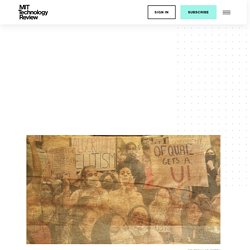
Analysis of the algorithm also revealed that it had disproportionately hurt students from working-class and disadvantaged communities and inflated the scores of students from private schools. On August 16, hundreds chanted “Fuck the algorithm” in front of the UK's Department of Education building in London to protest the results. Google Has a Plan to Disrupt the College Degree. Google recently made a huge announcement that could change the future of work and higher education: It's launching a selection of professional courses that teach candidates how to perform in-demand jobs.
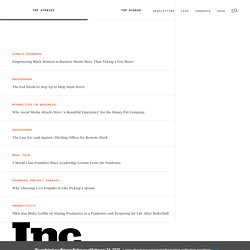
These courses, which the company is calling Google Career Certificates, teach foundational skills that can help job-seekers immediately find employment. However, instead of taking years to finish like a traditional university degree, these courses are designed to be completed in about six months. "College degrees are out of reach for many Americans, and you shouldn't need a college diploma to have economic security," writes Kent Walker, senior vice president of global affairs at Google. "We need new, accessible job-training solutions--from enhanced vocational programs to online education--to help America recover and rebuild.
" Why Are Finland's Schools Successful? Tab crash reporter. Online education is a burgeoning market, but with all the competition, finding your way toward earning a profit off an online course can be difficult. In fact, many would-be educators wonder if it’s even possible. Well, we believe it is. To get you started, here are 7 proven ways to make money selling courses online. Children going to school having to cross a river by pulley in Modena, Italy. 1959 : interestingasfuck. The Role of Presence. Arizona State sees some early adaptive courseware success. Arizona State University’s College Algebra classes have looked a little different these past few years.
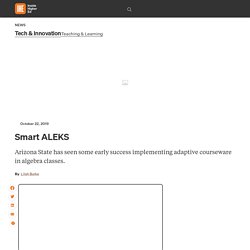
If you entered a classroom in the fall of 2015, you’d likely find 100 to 140 students listening to the professor lecture. Today, walking into an algebra classroom, you’d see those same 100 students all on their computers, with a professor and five undergraduate assistants roaming the class to give personalized help. The experiment, an implementation of the adaptive courseware model ALEKS, has paid off, administrators say. The rate of students who achieve a C or higher in College Algebra, which was 57 percent in 2015, is now up to 79 percent.
Story continued below… Enjoying this article from Inside Digital Learning? I have read and agree to the terms ofInside Higher Ed’s Privacy Policy. WHAT NOBODY TOLD YOU ABOUT ONLINE COLLEGE.
Teaching strategies for helping make students more responsible for their own learning (opinion) Three subtle forces weakening academic freedom (opinion) Across the world today, academic freedom is endangered.
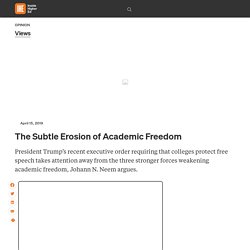
Political leaders in Brazil, India, Poland and Turkey have all recently threatened professors. Two of the world’s most powerful states, China and Russia, are famous for monitoring what universities teach. The Corporations Devouring American Colleges - The Huffington Post. If there’s one thing you can count on in these uncertain times, it’s that the cost of college will rise—and then rise some more.
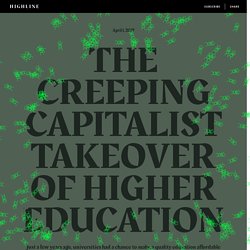
Almost every year, whether the economy is in a state of boom or bust, tuition hits a record high. But why? Is it really twice as expensive to provide a degree as it was 20 years ago? Can 'light-touch, targeted feedback' to students improve their perceptions of and performance in a class? Students benefit from increased faculty engagement.
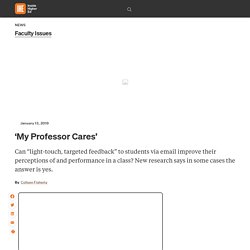
Yet many professors still resist more student-centered teaching. Part of the problem is that graduate schools are slow to adopt pedagogical training, meaning that some professors may want to up their interaction with students but don’t know how. Another part of the problem is that becoming a better teacher takes time, an increasingly scarce faculty resource. Kids Shouldn’t Have to Sacrifice Privacy for Education. Internet Curated: A collection of 100+ hand-picked curated resources & tools.
Georgia Tech launches second low-cost online master's degree program. The Georgia Institute of Technology will this fall offer an online master’s degree program in analytics for less than $10,000, a new investment in the institute’s model for low-cost, online graduate education.
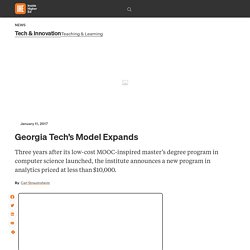
The interdisciplinary program, called OMS Analytics, follows the blueprint the institute created with its online master’s degree program in computer science, known as OMSCS, which launched in 2014 and has grown to about 4,000 students. Last year, Georgia Tech announced plans to expand the model into new fields. Don’t go to art school – I. M. H. O. – Medium. Paul Ford: What is Code? Experts Say Class Size Can Matter for Online Students. As an undergraduate pursuing a bachelor's in nursing, Ronda Clark was accustomed to taking online classes with 30 or 40 other students.

She checked in to discussion forums as required, but felt she didn't have meaningful interaction with her fellow classmates. "It was a free-for-all," says Clark, a military spouse who lives on the Marine Corps base in Quantico, Virginia. "There was little organization. " So Clark was pleasantly surprised by the family nurse practitioner online master's program at Massachusetts' Simmons College, which she started in 2013. There, her classes had 15 people maximum and all discussions took place in a live video environment. Faculty Load. Editor’s Note: Most instructors find teaching online courses requires more time than traditional courses.
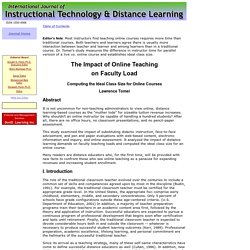
Both teachers and learners agree there is usually more interaction between teacher and learner and among learners than in a traditional course. Dr. Mathematical Models in Education and Training - RM6357.pdf.
Pavlov's Dog. National University. Penn State World Campus. Outlook Web App. Penn State - Careers: Job Opportunities. Department of Psychology. Moodle. TeacherResources. Estellas site formely Project Aspiration Inc. Decision 411 Course Outline 2005. Robert Nau Fuqua School of Business Duke University Tweet This web site contains notes and materials for an advanced elective course on statistical forecasting that is taught at the Fuqua School of Business, Duke University.
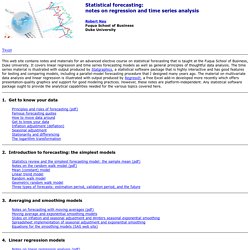
It covers linear regression and time series forecasting models as well as general principles of thoughtful data analysis. 1. Principles and risks of forecasting (pdf)Famous forecasting quotes How to move data around Get to know your data Inflation adjustment (deflation) Seasonal adjustment Stationarity and differencing The logarithm transformation 2. Statistics review and the simplest forecasting model: the sample mean (pdf)Notes on the random walk model (pdf)Mean (constant) model Linear trend model Random walk model Geometric random walk model Three types of forecasts: estimation period, validation period, and the future 3. 4.
Notes on linear regression analysis (pdf)Introduction to linear regression analysis Mathematics of simple regressionRegression examples.